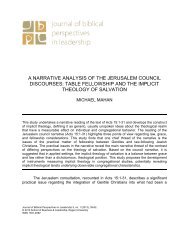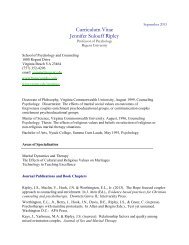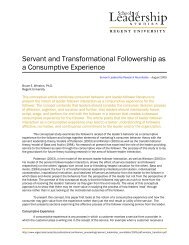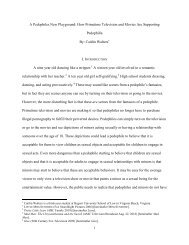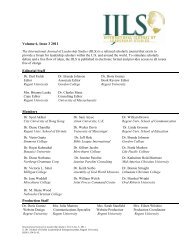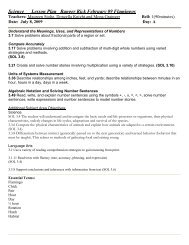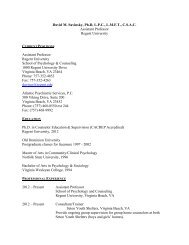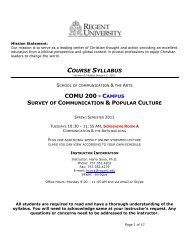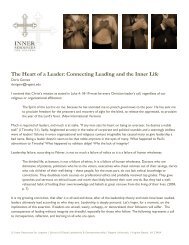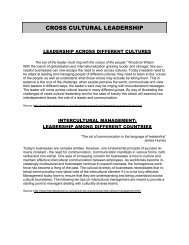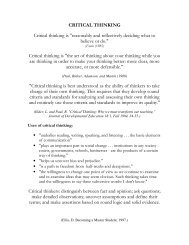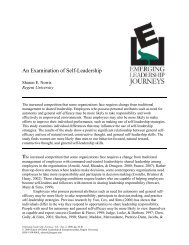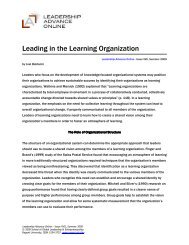Edifying the New Man: Romanian Communist ... - Regent University
Edifying the New Man: Romanian Communist ... - Regent University
Edifying the New Man: Romanian Communist ... - Regent University
Create successful ePaper yourself
Turn your PDF publications into a flip-book with our unique Google optimized e-Paper software.
Bocarnea & Osula/INTERNATIONAL JOURNAL OF LEADERSHIP STUDIES 206<br />
message or objective can be found in o<strong>the</strong>r leaders from FDR and Winston Churchill to Mahatma<br />
Gandhi and Nelson <strong>Man</strong>dela.<br />
Causal Definition<br />
A myth is also “a product of imaginations oriented and sustained by one or more basic<br />
needs and feelings in response to a critical situation which is experienced, consciously or<br />
unconsciously, by <strong>the</strong> society as whole, by members of a class, or by individuals as persons”<br />
(Murray, 1960, p. 342). The <strong>New</strong> <strong>Man</strong> myth was designed to prevent intolerable conflicts, curing<br />
contradictions that might appear in <strong>the</strong> Socialist system. The <strong>New</strong> <strong>Man</strong> was <strong>the</strong> conscious builder<br />
of <strong>the</strong> <strong>Communist</strong> future. He understood <strong>the</strong> society and its possible conflicts and solved <strong>the</strong>m<br />
according to his overall plan—Communism. The myth, in this sense, was a <strong>the</strong>rapy more for <strong>the</strong><br />
system than for <strong>the</strong> individual. The <strong>New</strong> <strong>Man</strong> was presented as a powerful change tool that would<br />
alter <strong>the</strong> character of <strong>Romanian</strong> society. Convincing <strong>the</strong> people to accept a degree of suffering—<br />
<strong>the</strong> importance of present sacrifices—was a necessary part of <strong>the</strong> myth making.<br />
The Mythopoeic <strong>New</strong> <strong>Man</strong><br />
The previous analysis finds <strong>the</strong> <strong>New</strong> <strong>Man</strong> as a collective prospective <strong>Communist</strong> myth<br />
with clear inspirational, eductional [sic], conational, and integrational functions. Each of <strong>the</strong>se<br />
functions plays into a broader leadership agenda in which <strong>the</strong> objectives of <strong>the</strong> individual<br />
(Ceausescu) become an expression of <strong>the</strong> organization (RCP). Both are <strong>the</strong>n reinterpreted as<br />
being similar in scope with a manifest national destiny.<br />
<strong>Edifying</strong> <strong>the</strong> <strong>New</strong> <strong>Man</strong> is mythopoeic in nature. Slochower (1976) stated that mythopoeia<br />
conveys a specific drama in three acts with an epilogue. The drama begins with a disrupted unity<br />
in <strong>the</strong> circumstances of <strong>the</strong> hero—a failure of conviction, a disturbance of faith, or a moral fall.<br />
The <strong>New</strong> <strong>Man</strong>’s surrogate drama began with <strong>the</strong> hero being uncomfortable with <strong>the</strong> Socialist<br />
present which, while better than <strong>the</strong> bourgeois past, was never<strong>the</strong>less far from <strong>the</strong> <strong>Communist</strong><br />
bright future. The <strong>New</strong> <strong>Man</strong> identified new contradictions in <strong>the</strong> Socialist society and articulated<br />
a leadership agenda that attempted to solve <strong>the</strong>se contradictions. This inspired a quest, a pursuit<br />
of <strong>the</strong> social circumstances previously taken for granted.<br />
The quest, <strong>the</strong> second act of <strong>the</strong> mythopoeic drama, involves <strong>the</strong> hero in a transgression<br />
against what his social group regards as a natural or sacred order. It is now <strong>the</strong> time when <strong>the</strong><br />
hero becomes <strong>the</strong> agent of transformation of his culture. Transforming himself continuously, <strong>the</strong><br />
<strong>New</strong> <strong>Man</strong> was always one step into <strong>the</strong> future. He was a perennial revolutionary: “The<br />
revolutionary process will continue even in <strong>the</strong> <strong>Communist</strong> society, it will never end”<br />
(Ceausescu, 1984, p. 5). The hero was a permanent agent of change of his society.<br />
The third act of Slochower’s (1976) mythopoeia is a kind of homecoming, a recreation, or<br />
a rebirth. The hero revitalizes his relationship to <strong>the</strong> tradition he has violated. The victory of <strong>the</strong><br />
mythopoeic hero is <strong>the</strong> victory of social morality. The hero alters <strong>the</strong> tradition in its parts that<br />
have become corrupt and stale. It is Communism that <strong>the</strong> <strong>New</strong> <strong>Man</strong> was supposed to bring into<br />
being, <strong>the</strong> new order built from <strong>the</strong> ashes of <strong>the</strong> old one. In <strong>the</strong> <strong>Communist</strong> mythopoeia, <strong>the</strong> <strong>New</strong><br />
<strong>Man</strong> seems to never find his homecoming as he restlessly is preoccupied with <strong>the</strong> best society to<br />
be achieved by mankind—Communism. This set <strong>the</strong> stage for an ongoing revolution or <strong>the</strong><br />
endless remaking of tomorrow’s world.<br />
International Journal of Leadership Studies, Vol. 3 Iss. 2, 2008, pp. 198-211<br />
©2008 School of Global Leadership & Entrepreneurship, <strong>Regent</strong> <strong>University</strong><br />
ISSN 1554-3145



